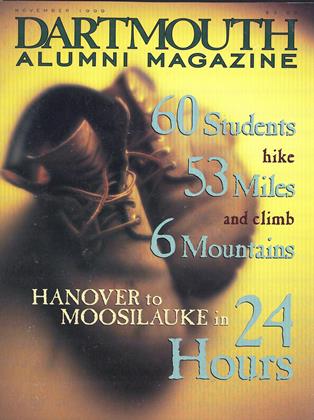These days, students craving something different for the palate need look no further than campus for a good In exchange for some attentiveness and a few dollars sometimes none—the gastronomically inquisitive will find myriad opportunities in which to sample other cuisine, from barbecue-pork buns with oolong tea at a Dartmouth China Society Teahouse, Israeli falafel at the Middle Eastern languages department's Falafel Hour, or roasted lamb prepared onsite at a Gambian festival. With plates heavy and attention piqued, students confirm that the best way to their feet is through their stomachs.
Student groups have learned to build events around meals. "Food's a big draw," said Brian Feldman '00, a member of the Council on Student Organizations, which co-sponsors various events on campus. "When students are planning events, they often insist on funding for food."
Some food-centered events try to foster student knowledge of issues and places beyond the Green. As part of last November's Hunger and Homelessness Awareness Week, Students Fighting Hunger organized a hunger banquet where guests were served meals in keeping with personal income levels in various countries. Last winter, the Jamaica Volunteer Immersion Program held its second annual Jamaica Culture Night, featuring the campus reggae group Butter, a dinner—seasoned chicken with rice and fried banana and a slide show. "It was an environment purely about learning, as opposed to taking notes in the classroom it made it more enjoyable," said RyanMaimone '02, who spent a rare free weeknight at Jamaica Culture Night. "I'd never listened to reggae music or had Jamaican food before."
For the last decade, the "culture night" has become a staple on campus, and it is unusual for a week to pass without the promise of an evening of food, dance and song. This is owing largely to the fact that of the 110 student organizations on campus, 25 are affiliated with a specific culture.
For many such groups, the culture night has evolved into an annual or semi-annual effort. In some cases it is the only event a group holds for the entire year. Usually, culture nights will ambitiously incorporate hours of entertainment and easily draw audiences of more than 100 each. The perennially popular Dartmouth Asian Organization's Culture Night packed its pro gram this year with skits, a kung-fu exhibition, dances, a choreographed fashion show poetry readings, and naturally—traditional dishes of China, Korea, Japan, and India. A joint effort among the Asian organizations at Dartmouth, D.A.O. Culture Night struck its 200-ticket maximum in two days.
Food is not always a means to an end. In other cultures, it is the end itself—the enjoyment of food is the social occasion. In Spanish culture, for example, the term sobremesa is the name of the animated discussion which follows a meal. For Dartmouth students, it is a more pleasant alternative to morning drill. Within the last ten years, some College language departments have introduced weekly cafes such as the Nihongo ("Japanese") Table at Collis, the Portuguese Cafezinho at the Ponto de Econtro in Dartmouth Hall, the Kaffestunde at the Kade German Center (begun in the eighties), and the Cafe Francais at La Maison de la Francophonie (the French House) to allow language students, native speakers, and even members of the Hanover community to parlez over light refreshments.
For the Cafezinho, the refreshments come in the form of small cups of cafezinhos (Brazilian coffee), cookies, and sometimes doces ("sweets") prepared by cafe coordinator and Portuguese professor Rodolfo Franconi. As it is intended to promote LusoBrazilian culture, the Cafezinho features Brazilian, Portuguese, and Lusophone music, plays videos related to the Language Study Abroad program in Curitiba, and occasionally hosts visiting artists.
"I get a chance to hang out with native speakers and pick up cultural tidbits that I might not be able to pickup in class, and I get to see friends that I met in class," says Cafezinho regular Carlos Osorio '99. "And the coffee is great."
If you measure the College by what it eats, then Dartmouth is a global village.
 View Full Issue
View Full Issue
More From This Issue
-
 Cover Story
Cover StoryHanover to Moosilauke or Bust
November 1999 By Jon Waldman ’00 -
 Feature
FeatureMiraculously Builded
November 1999 By David M. Shribman ’76 -
 Feature
FeatureBadly, He Wrote
November 1999 By Rich Barlow ’81 -
 Feature
FeatureWebster in the Raw
November 1999 -
 SYLLABUS
SYLLABUSThe Undead
November 1999 By Kathleen Burge ’89 -
 PRESIDENTIAL RANGE
PRESIDENTIAL RANGEThe Numbers Game
November 1999 By President James Wright







